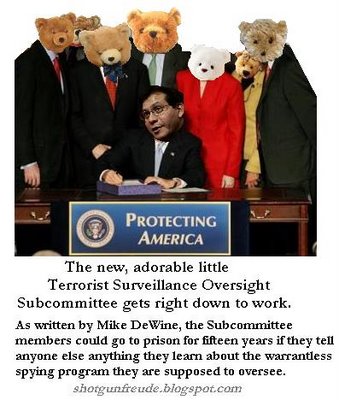Our hero Russ Feingold is introducing a resolution to censure Bush for breaking the law with his warrantless domestic spying program.
Glenn Greenwald has some great comments on it. Regarding Frist's reaction to Feingold: "It is not possible to exemplify how an authoritarian cultist thinks and acts any more vividly than Frist did in making this statement..." But tell us what you really think, Glenn.
In the statement to which Greenwald refers, Frist repeats the frequent accusation that any form of disagreement with Bush equals aiding terrorists. It doesn't give much comfort to hear reassurances that the warrantless domestic spying program is only targeted at terrorist groups and those who affiliate with or provide aid and comfort to terrorist groups, when they also so often equate dissent with providing aid and comfort. Even when that dissent takes the form of expecting our leaders to follow the Constitution.
Frist's reaction needs to be repeated here, so we can see what he's saying:
FRIST: George, what was interesting in listening to my good friend-Russ, is that he mentioned protecting the American people only one time, and although you went to politics a little bit later, I think it's a crazy political move and I think it in part is a political move because here we are, the Republican Party, the leadership in the Congress, supporting the President of the US as Commander in Chief, who is out there fighting al Qaeda and the Taliban and Osama bin Laden and the people who have sworn, have sworn to destroy Western civilization and all the families listening to us. And they're out now attacking, at least today, through this proposed censure vote, out attacking our Commander in Chief. Doesn’t make sense.
In other words:
(1) Feingold is attacking the President
(2)(a) But the President is fighting the terrorists -
(2)(b) Therefore, it doesn't make sense to attack the President
((2)(corollary) So, as long as the President is fighting terrorists, he should be immune from criticism; the substance of that criticism doesn't come into the equation at all - even if the President is violating the law and the Constitution, it "doesn't make sense" to get to the point of asking in the first place whether that is a possibility.)
Feingold repeats what is clear to everyone who has considered this: we all want to fight and capture or kill terrorists who mean harm to this country. But the issue here is whether to hunt terrorists in conformity with or in violation of FISA, leading to the issues of whether there is any difference in the security effectiveness of getting FISC warrants versus failing to secure warrants, and whether America and its servants in Congress will hold the federal law and the Constitution to be meaningful, or whether "it doesn't make sense to criticize the President or hold him accountable to the law" is the only constitution left in effect in this country.
The administration's only defense for violating FISA, i.e. for failing to seek warrants for their domestic spying, is that all that paperwork is a burden - apparently annexing an asterix to the entire Constitution saying *To be followed as long as you feel like doing the paperwork. They haven't shown any reason why following FISA wouldn't be just as effective at neutralizing terrorist groups. We can defend this country from its external enemies just as well - more effectively, in fact - within the rule of law. No lousy Islamist extremists have the power to destroy America. The only way America could be destroyed is from within - if we, in the form of what we allow our government to do, are too weak and fearful to maintain those noblest ideals of our Constitutional democracy in the face of threats by cowardly death-cult Islamists.
If we were to allow our government to continue abusing detainees, we would inevitably become ever more accepting of it - as the soldiers and agents following orders, and as American people. I am tired of apparatchik politicians deriding criticism of detainee abuse as concern for terrorists. We have seen that many of the people being held at the overseas prisons were apparently lacking any connection with anti-American groups. Whether that is true in individual cases is besides the point: the point is that:
- we don't even have a due process in effect to find out if they are innocent,
- we are effectively cruelly punishing everyone there regardless of objective evidence, and
- once we have gotten used to it being "okay" to strip away all rights and human dignity of foreigners, it would be only a matter of time before it became "okay" to do the same with Americans.
Orwell liked to quote Mussolini saying that democracy and fascism can never co-exist for very long; they are both a grave threat to one another, and one of the two must quickly destroy the other. It's a little ironic that Bush's foreign policy rhetoric embodies that view as to foreign governments - which is wonderfully admirable, despite the undemocratic provincialism of some reactionary leftists - while at home he seems determined to exalt the executive above the rule of law. That is precisely the fate which the Constitution was set up to avoid. Fear of an unbounded, monarchial executive saturates the Constitution and the contemporaneous writings of the Founders, it drips from every page of their thoughts.
Nor do I think the current state of affairs can persist much longer. Despite the depressing, cynicism-inspiring Apparatchik-speak exemplified by Frist's remarks above, there are too many decent American people throughout every corner of government and society to remain forever ignorant or tolerant of un-American programs like the warrantless domestic spying or the abuse of foreign detainees. People like
Alberto J. Mora - or like some old personal friends of mine in the NSA and other government agencies, whom I trust implicitly.
The Dubai ports debacle didn't have that much to do with Dubai or ports - it seemed like every quotation from members of Conngress referred to their patience having been exhausted with trying loyally to defend the administration on warrantless domestic spying, detainee abuse, etc. The overwhelming Congressional rejection of the President's position on the ports, and the currently tanked poll numbers, are symptoms of America's immune response to the foreign tissue the administration tried to transplant into the body politic - the disregard, foreign to our nature, for the rule of law and universal human dignity.
The growing rebellion of conservatives - Bruce Fein, Bob Barr, George Will, David Kris, Bill Kristol, Bruce Bartlett, etc. - against the excesses of the administration, shows that the American ideal weighs more heavily in the collective American conscience than ideological or party loyalty. Ultimately, the Constitution of the United States is the American ideal branded in the hearts and minds of all its citizens. That Constitution cannot be waived away with secret orders and slapdash legal memos.




